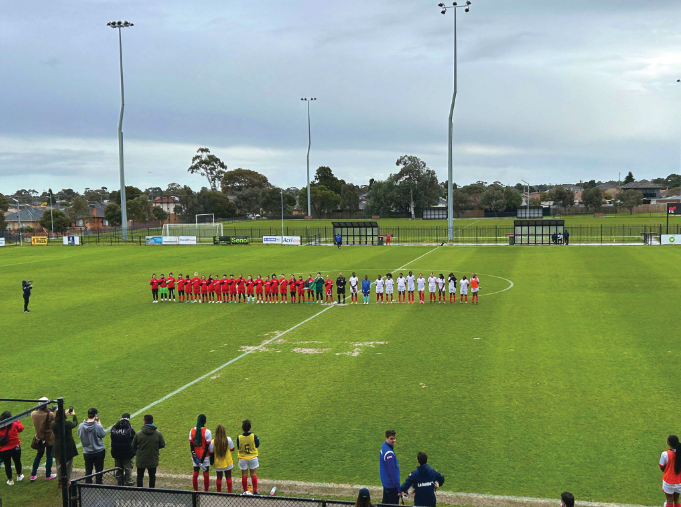
Permission to use images by Adriano Del Monte, Italian-Australian international TVpresenter and event host (FIFA, UEFA).
Banned from playing sport in their home country and with FIFA failing to recognise them, Afghanistan’s women’s national football team have been cheering on the Matildas and watching the 2023 Women’s World Cup from their adopted homeland, Australia.
The Afghan Women’s Team (AWT) is now based in Melbourne after being forced to flee from the Taliban during the fall of Kabul. In August 2021, Afghan players and staff jostled alongside desperate crowds of people attempting to make it onto a plane at Kabul airport in the final days of US occupation.
A new beginning in Australia
The team arrived in Australia in September 2021 with nothing but the clothes on their backs. They were welcomed by the Australian government and have been thrown a lifeline by several individuals and organisations who were quick to offer support. A-League club Melbourne Victory has taken on the AWT giving them access to their network of coaches and facilities as well as providing financial support. The team now plays in the Victoria State League 3.
Fatima Yousufi is the 21-year-old captain of AWT. She describes herself on X (Twitter) as “goalkeeper by day, peacekeeper by night”.
Fatima was 19 when the Taliban came to power in 2021. As a child, she watched football on TV with her younger brother and dreamed of playing. She began playing in the schoolyard, was spotted by a scout and then invited to train with Afghanistan’s under 17s team. In an interview with UNHCR, Fatima said her life changed in 2021. It was no longer safe to play football, so she buried her trophies and jerseys in the backyard and fled.
Taliban bans women in sport
Founded in 2007, the AWT quickly became one of the most successful teams in the region. The team qualified for the Asian Football Confederation (AFC) Women’s Asian Cup in 2010 and 2014, and it finished third in the South Asian Football Federation (SAFF) Women’s Championship in 2016.
However, the team’s progress came to a halt in 2021 as the Taliban came to power and banned women from playing sports.
Why won’t FIFA recognise the Afghan Women’s Team?
The global response to the AWT’s plight has been a heart-warming example of international solidarity, yet the denial of recognition by FIFA is a cruel setback. With a high level of interest in the 2023 Women’s World Cup, the spotlight has turned on FIFA and why it has turned its back on the AWT. A FIFA spokesperson told SBS Dari that ‘FIFA could only recognise a team once it was first recognised by the country’s member association, in this case the Afghanistan Football Federation.’
United in the fight for FIFA recognition
A petition for FIFA recognition is currently gaining momentum on change.org. At the time of publication, close to 80,000 had signed in support of the AWT. This comes off the back of record-breaking crowds at World Cup games in Australia and New Zealand and reflects a growing global call for gender equality in sports and a stand against discrimination.
A beacon of hope
The story of the AWT serves as a shining example of courage and commitment in the face of immense adversity. Former Socceroo captain and human rights advocate, Craig Foster, helped bring the team to Australia and has been supporting them ever since. In an interview with UNHCR in July 2023, Craig said:
“They’ve become a symbol of women’s and girls’ rights in Afghanistan and all around the world and a very important group within Australian society.”
While women and girls and in Afghanistan are prohibited from even kicking a ball, each time the AWT pull on their jerseys in Melbourne, they are sending a powerful message to the world that women’s rights cannot be suppressed.




































































































































